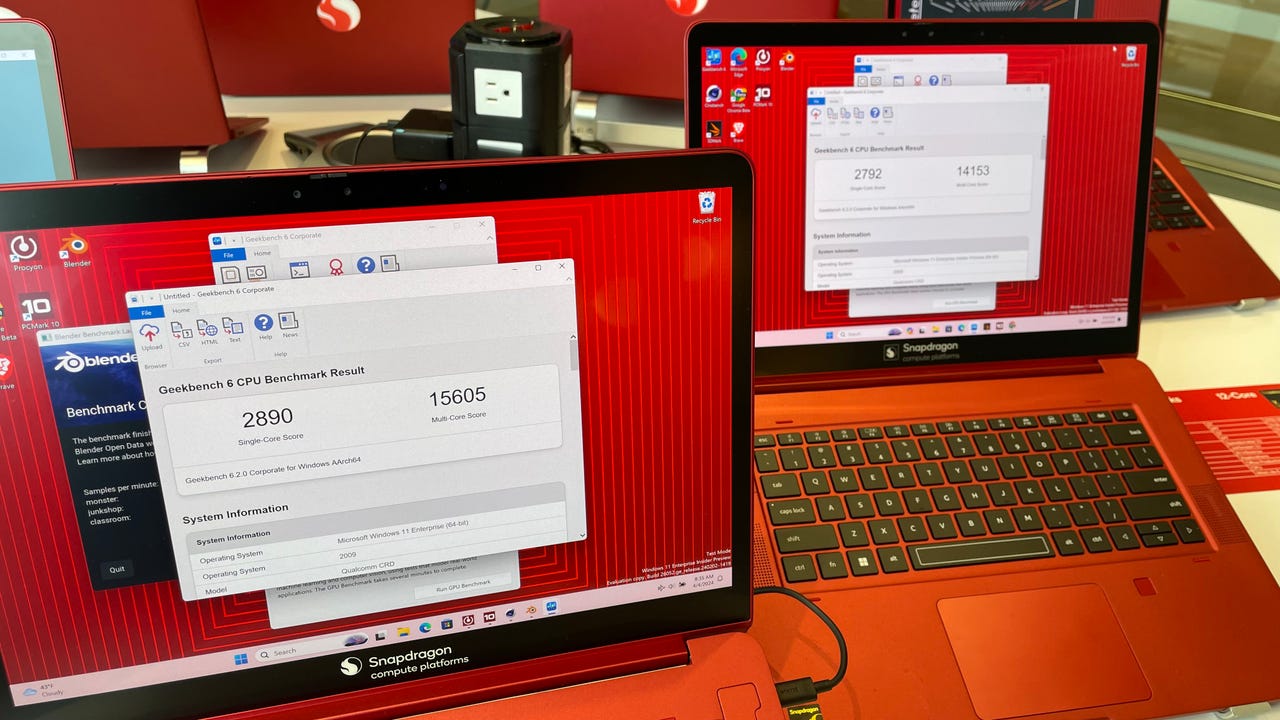
Exclusive Look: Microsoft's Revolutionary AI Chip Challenge to Apple MacBook Unveiled

Exclusive Insight: Microsoft’s Revolutionary AI Chip Poised to Outshine Apple MacBook - Firsthand Experience

Kyle Kucharski/ZDNET
Microsoft’s upcoming line of Surface Pro and Surface laptops are expected to come with Qualcomm’s new Snapdragon X Elite processors, making waves with impressive performance metrics that could rival, or even surpass, Apple’s flagship MacBooks, which have long sat at the top of the food chain .
Launching in late Spring 2024, Microsoft is apparently so confident in the performance of Qualcomm’s new ARM-powered chips for Windows, The Verge reports , that its soon-to-be-released line of Surface tablets and laptops will be at the forefront of a big push for AI-powered computing.
Also: Microsoft unveils Surface Pro 10 and Laptop 6 with AI features. Here’s what’s new
If 2024 is the year for AI’s full integration into PCs, ARM-powered Windows is part of that overarching design. The ARM architecture refers to the physical design of the processor that largely powers devices like smartphones, tablets, and notably, Apple’s processors. These chips bring a lot of advantages over the traditional x86 processors produced by Intel and AMD, most notably less power consumption alongside cutting-edge performance.
Newsletters
ZDNET Innovation Weekly
ZDNET Innovation brings you the week in future-forward technology from around the world.
Subscribe
I recently had a chance to see the Snapdragon X Elite series at a demo event hosted by Qualcomm, which definitely made some big claims in terms of their performance, particularly as positioned against Apple’s M3 silicon. These improvements aren’t just theoretical projections up against emerging AI technology but easy-to-understand metrics that laptop consumers are concerned about now, such as boot-up speed and app launch speed, not to mention the significant reduction in power consumption, which means smaller designs that run cooler and featuring batteries that last longer.
Also: For the age of the AI PC, here comes a new test of speed
Up until now, Windows laptops and PCs have run almost exclusively on Intel and AMD chips, but Microsoft’s replacement of Intel Core Ultra processors in the new line of consumer Surface Pro and Surface laptop with the Snapdragon X Elite chips signals an industry change, not just in manufacturers’ confidence in Qualcomm’s product, but a potential new norm for new devices.
When the The Snapdragon X Elite was announced in October 2023, Qualcomm claimed it was 21% faster than Apple’s M3 chip in a multi-core CPU performance benchmark. However, questions still remain about the Snapdragon X Elite’s thermal capabilities, as they will likely run hotter than Apple’s M3 chips and require cooling fans. Apple, on the other hand, has the ability to optimize every element of its chipset’s design as the maker of both the hardware and the operating system.
Kyle Kucharski/ZDNET
This new series of devices running Qualcomm processors will likely be the first ones to gain access to Windows 11’s cutting-edge AI functionalities. The Snapdragon X series features a large amount of space dedicated to neural processing, resulting in what may be among the fastest AI-powered devices on the market.
Also: Surface vs. MacBook: Can Microsoft’s new Arm-based AI PCs compete with Apple?
Running Windows on ARM architecture won’t all be smooth sailing, as there will likely be some ironing out of compatibility issues with certain apps (particularly with gaming). Emulating applications designed for the x86 platform should be seamless, for the most part.
Microsoft banking on the Snapdragon X series’ performance seems, to us, just one part of a larger picture. CEO Satya Nadella will likely elaborate on Windows 11 infused with AI-powered tasks at a special Windows and Surface AI event on May 20, just ahead of Build 2024.
Featured
The 10 best laptop deals ahead of October Prime Day
Google’s AI podcast tool transforms your text into stunningly lifelike audio - for free
My favorite Garmin sports watch ever just got a new version, and it costs $200 less
5 nearly hidden Android features you should already be using
- The 10 best laptop deals ahead of October Prime Day
- Google’s AI podcast tool transforms your text into stunningly lifelike audio - for free
- My favorite Garmin sports watch ever just got a new version, and it costs $200 less
- 5 nearly hidden Android features you should already be using
Also read:
- [New] Invisible Intensity Covert Volume Reduction in Garageband
- [Updated] In 2024, The Art of Bounce Two Ways to Liven Up Your Text
- 2024 Approved Converting Ordinary Images Into Artistic HDR Works
- 2024 Approved The Power of Persuasion Exploring 6 Video Genres
- How To Change Your SIM PIN Code on Your Vivo V29e Phone
- In 2024, Best 10 Mock Location Apps Worth Trying On Vivo Y78+ (T1) Edition | Dr.fone
- Nouvelle Version Du Logiciel De Reconnaissance OCR ABBYY : FineReader Server Est Maintenant Disponible
- Protect Your iPhone: How Safe Are In-Car Chargers? Expert Reviews & Findings From ZDNet's Comprehensive Tests
- Revolutionary Approach: How Southwest Airlines Seeks Improved Service Experience, According to ZDNet
- Revolutionizing Vehicle Safety: Tesla Upgrades Car Sensor Technology - Discover What It Means for Consumers | TechZine
- Save Money, Save the Planet with Google Maps' New 'Eco-Routing': More Routes Offer Fuel Savings & Environmental Benefits | ZDNET Insights
- Singapore Airlines Enhances Inflight Experience with Complimentary Limitless Internet Access for All Passengers
- Tackling Hearthstone's Volume Void: A Complete Guide to Restoration
- Title: Exclusive Look: Microsoft's Revolutionary AI Chip Challenge to Apple MacBook Unveiled
- Author: George
- Created at : 2024-11-26 18:49:52
- Updated at : 2024-11-27 17:31:33
- Link: https://hardware-tips.techidaily.com/exclusive-look-microsofts-revolutionary-ai-chip-challenge-to-apple-macbook-unveiled/
- License: This work is licensed under CC BY-NC-SA 4.0.